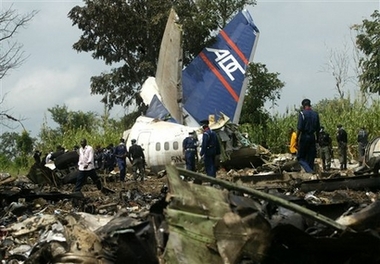ABUJA, Nigeria - A plane crash that killed 96 people in Nigeria might have
been averted if the pilot had heeded advice from air traffic controllers to wait
for a lightning storm to clear before taking off, the aviation minister said
Monday.
Citing the decision as a possible cause of the third fatal passenger jet
crash in this West African nation in a year, Aviation Minister Babalola
Borishade said the government was preparing guidelines to stop such "reckless
abuse of crew discretionary power."
|

People walk at the site of an airplane crash site in Abuja,
Nigeria, Monday, October 30, 2006. The pilot of a Nigerian airliner that
crashed a day earlier did not heed air traffic controllers' advice to wait
for stormy weather to clear before taking off, the minister of aviation
said Monday. The pilot was among 96 people killed in the crash; nine
people survived. [AP]
|
Borishade did not directly blame pilot error for Sunday's crash, and
authorities were still investigating what brought down the Boeing 737 owned by
the Aviation Development Co.
The government ordered all of the privately owned airline's planes grounded
indefinitely and suspended its flying license, Borishade said.
The airline last suffered a crash in 1996 when one of its jets plunged into a
lagoon outside Nigeria's main city, Lagos, killing all 143 aboard.
The latest crash killed 96 of the 105 people aboard, including the pilot and
Nigeria's top Muslim leader, Muhammadu Maccido. The jet smashed into savannah
near Abuja airport and broke apart, scattering luggage and body parts across a
wide area.
Both the aircraft's flight data recorder and cockpit voice recorder were
recovered and turned over to investigators, said Asgus Ozoka, who heads
Nigeria's Accident Investigation and Prevention Bureau.
Representatives of aircraft manufacturer Boeing Co. and engine maker Pratt
& Whitney are expected in Nigeria on Tuesday to help with the investigation,
Ozoka said.
The plane crashed about one minute after takeoff in bad weather that
Borishade said included rain, gusty winds, thunder and lightning.
Air traffic controllers warned the pilot of the doomed flight that the
weather would worsen, he said.
"The air traffic controller re-emphasized the deteriorating weather condition
and gave wind checks, which they (the crew) acknowledged," Borishade told
reporters in Abuja.
But the pilot "refused to take advantage of the weather advice and the
opinion of the (control) tower to exercise patience and allow the weather to
clear for a safe takeoff."
A Virgin Airlines flight that had been on the runway about the same time did
not take off because of strong winds, said Rowland Iyayi, head of the National
Air Space Management Agency.
"The discretionary power of the air crew to override advice from the tower
has been largely responsible for unfortunate consequences in the history of air
mishaps in this country," Borishade said. "The federal government has directed
the National Civil Aviation Authority to look into this and prepare appropriate
guidelines to stop this reckless abuse of crew discretionary power ... to ensure
safety."
ABC News correspondent Brian Ross said on the network's Web site that he was
aboard a flight waiting to take off from Abuja Sunday and saw the burning
wreckage.
"Our flight was the next to take off, directly behind the plane that
crashed," said Ross. "looking out the window I saw a large column of black smoke
and burning debris."
The airline released the flight manifest Monday, confirming the dead and nine
survivors, including three daughters of the governor of Kogi state who were
returning to study in the northern town of Sokoto.
"Two are in stable condition and one is still in intensive unit but has
improved," said the governor's spokesman, Farouk Adejo. "They were all sitting
separately."
Nigeria suffered two fatal crashes last year, and the latest crash brings the
death toll from the three air disasters to 320.
On Oct. 22, 2005, a Boeing 737-200 belonging to Bellview airlines crashed
soon after takeoff from Lagos, killing all 117 people aboard. On Dec. 10, a
McDonnell Douglas DC-9 operated by Sosoliso Airlines crashed while approaching
the oil city of Port Harcourt, killing 107 people, most of them children going
home for Christmas vacation.
After those disasters, President Olusegun Obasanjo ordered an overhaul of the
aviation sector, but it is unclear how much has been done. Airlines have been
subjected to checks for air-worthiness and some planes considered unworthy were
grounded.
Nigeria's government is under increasing pressure to fix an air industry
widely regarded as notoriously unsafe.
An investigation into the Bellview crash is still under way. Authorities
released a report blaming the Sosoliso crash on bad weather and pilot error.
The report also blamed other officials for the Sosoliso crash, saying the
plane's pilot received no weather briefing before he descended into a rainstorm
and tried to land despite poor visibility. The aircraft fell short of the
runway, skidded and hit an open concrete drain before bursting into flames.
The report highlighted other serious shortcomings of the Sosoliso crash:
runway lights had been switched off because staff of the Federal Airports
Authority, which controls them, were not working that day.